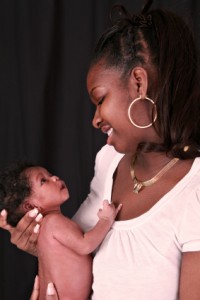May 10, 2012
Celebrating Mother's Day: Part Two: Infant Attachment
By: Kathy Morelli | 0 Comments

this is a guest post by Jessica Zucker, Ph.D.
Part Two: Fortifying Parenthood: Know Yourself
Part Two is about the importance of knowing yourself as a step towards developing healthy parenting practices.
Q: How can I prepare to become a parent who offers my child(ren) a different experience than I had growing up?
Awareness is essential. Having a reflective stance and carving out time to consider your attachment relationship history can have far-reaching effects on your future parenting patterns.
Research has found that their baby's emergent attachment security is more likely when parents have been honest with themselves about the realities of their own childhood experiences. This means we need not have experienced perfect, flawless childhoods ourselves in order to ensure our future offspring with secure relationships.
What is vital, however, is having a curiosity about the realities of how you were raised, your formative relationships, and how you were impacted by your experiences- the good, the bad, and everything in between.
Reviewing our lives through a raw and honest lens will allow us to more deeply understand why we are who we are. This type of reflection is a natural springboard for cultivating additional insight, mourning difficulties in childhood relationships, and honing aspects of your person-hood that may create a more harmonious babyhood for your children.
Cultivating a sense of reciprocal intimacy in the ever-changing relationship relies, in part, on how you navigate the many feelings that arise each day. It is not a danger to the budding relationship with your child to experience complex feelings. It is what you do with these poignant moments, how you understand the feelings, and the way you react to them that matters most.
There is no more powerful a way to invoke the memory of your childhood than to become a parent yourself. And the opposite of this is true as well.
Getting a taste of what you didn't get from your parents while parenting your newborn can stir enigmatic feelings that viscerally catch us off guard, leaving us potentially panic-stricken.
Our childhood histories don't simply fade into the background upon becoming a parent. In fact, entering the maze of motherhood often stimulates memories seemingly long forgotten. Though they might not be consciously remembered, early experiences get stored deep in the crevices of our psyches and in the muscle memory of our bodies.
A potentially daunting task, swimming in the complicated pools of our past ensures a smoother childhood for our offspring. Research states that 'experiences that are not fully processed may create unresolved and leftover issues that influence how we react to our children' (Siegel & Hartzell, 2003).
Attempting to make connections between the ways in which the past impacts the present awards us a freedom and flexibility of being with ourselves and with our children. Invariably, when we model for our children an embodiment of authentic reflexivity we provide them with opportunities for deepening connection. Developing a clearer sense of how we have been shaped by the parenting we received fosters a more conscientious parenting path.
Consistency builds healthy attachment. Predictability yields trust. Bonding strengthens connection.
Engendering these experiences in your child might require you to dig deep-to excavate your own childhood experiences with the aim of being the best parent you can be.
Book References:
Siegel, D. J. & Hartzell, M. (2003). Parenting from the inside out: How a deeper understanding can help you raise children who thrive. New York: Penguin Books.
Siegel, D. & Payne Bryson, T. (2011). The whole-brain child. New York: Random House.
Perinatal and Postpartum Mood Disorders: Perspectives and Treatment Guide for the Health Care Practitioner (2008). S. D. Stone and A. E. Menkin (Eds). New York: Springer Publications.
Wallin,D. (2007). Attachment in psychotherapy. New York: The Guilford Press.
Wiegartz, P. (2009). The pregnancy and postpartum anxiety workbook. Oakland, California: New Harbinger Publications.
Web Reference:
Early Moments Matter: PBS Toolkit
http://www.earlymomentsmatter.org/
Dr. Jessica Zucker is a clinical psychologist in Los Angeles specializing in women's reproductive and maternal mental health with a focus on transitions in motherhood, perinatal and postpartum mood disorders, and parent-child attachment. Jessica studied at Harvard University and New York University. She is an award-winning writer and a contributor to The Huffington Post and PBS This Emotional Life. Dr. Zucker is currently writing her first book about mother-daughter relationships and issues surrounding the body (Routledge). Jessica consults on numerous projects pertaining to the motherhood continuum.
Web: www.drjessicazucker.com
Twitter: @DrZucker
Tags
Postpartum Babywearing Babies Kathy Morelli Attachment Parenting An Infant